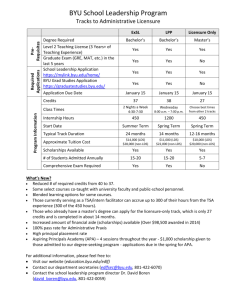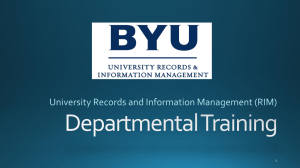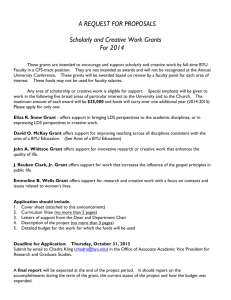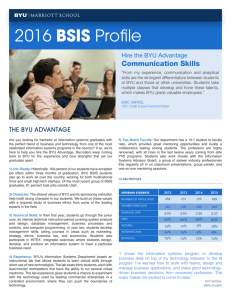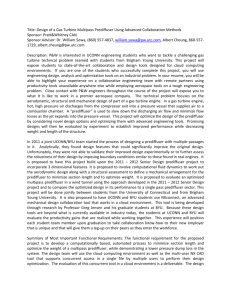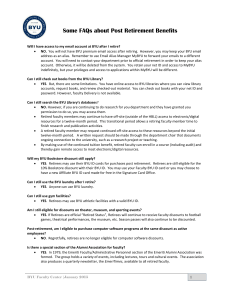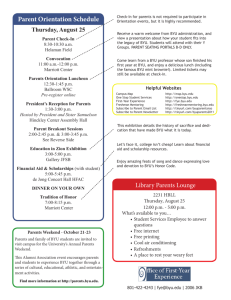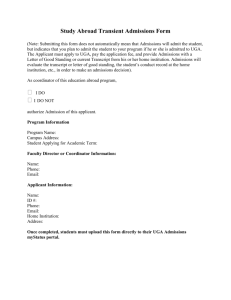Student Exchange Policy
advertisement
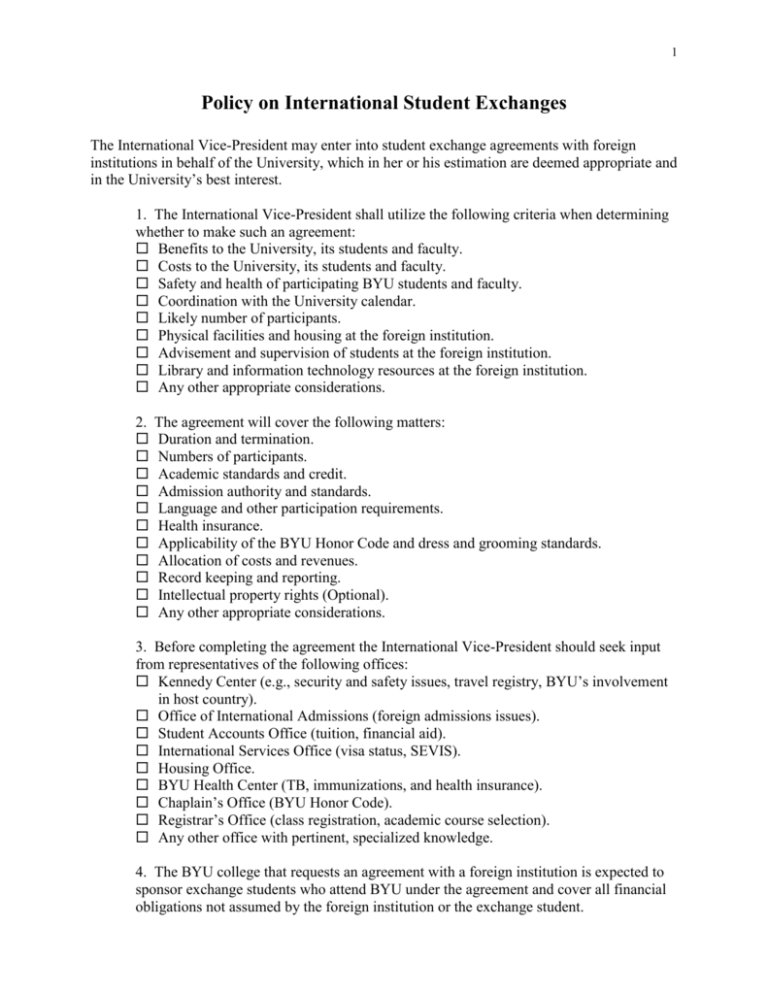
1 Policy on International Student Exchanges The International Vice-President may enter into student exchange agreements with foreign institutions in behalf of the University, which in her or his estimation are deemed appropriate and in the University’s best interest. 1. The International Vice-President shall utilize the following criteria when determining whether to make such an agreement: Benefits to the University, its students and faculty. Costs to the University, its students and faculty. Safety and health of participating BYU students and faculty. Coordination with the University calendar. Likely number of participants. Physical facilities and housing at the foreign institution. Advisement and supervision of students at the foreign institution. Library and information technology resources at the foreign institution. Any other appropriate considerations. 2. The agreement will cover the following matters: Duration and termination. Numbers of participants. Academic standards and credit. Admission authority and standards. Language and other participation requirements. Health insurance. Applicability of the BYU Honor Code and dress and grooming standards. Allocation of costs and revenues. Record keeping and reporting. Intellectual property rights (Optional). Any other appropriate considerations. 3. Before completing the agreement the International Vice-President should seek input from representatives of the following offices: Kennedy Center (e.g., security and safety issues, travel registry, BYU’s involvement in host country). Office of International Admissions (foreign admissions issues). Student Accounts Office (tuition, financial aid). International Services Office (visa status, SEVIS). Housing Office. BYU Health Center (TB, immunizations, and health insurance). Chaplain’s Office (BYU Honor Code). Registrar’s Office (class registration, academic course selection). Any other office with pertinent, specialized knowledge. 4. The BYU college that requests an agreement with a foreign institution is expected to sponsor exchange students who attend BYU under the agreement and cover all financial obligations not assumed by the foreign institution or the exchange student. 2 Administrative Addendum Foreign Student Coming to BYU 1. Foreign school sends foreign student’s application to the exchange program specialist at each college/school. a. Undergraduate student application forms that have to be submitted for the exchange program are: Part 1 - Student Information Part 2 - School Selection i. Admissions will create a new classification for International Exchange Students under “Confirm your admission type” ii. Under the International Exchange Student classification, student must specify the major program that he or she is applying to in order to be eligible to register for “major only” classes Part 3 - Student Commitment and Confidential Report Part 6 - Extracurricular Activities Part 8 - International Student Information i. Students should show financial proof to cover all expenses except Tuition Evidence of competencies in English (TOFEL Test) 2. College/school exchange program specialist meets with the program admission committee (Undergraduate Program) to review the application and pre-accept/decline it. If declined, the exchange program specialist informs the foreign school. 3. If pre-accepted, college/school exchange program specialist sends student’s application to the Admissions Office. 4. If the international exchange student is accepted by the Admissions Office, it sends the I-20 form and letter of acceptance to the student. The Admissions Office sends the student’s information to the International Services Office. The Admissions Office releases student’s registration in the system. a. The BYU Student Accounts Office will create a new classification for international exchange students. (To be approved by the Dean of Admissions). 5. The International Services Office sends the orientation information to the international exchange student. 6. Exchange students report to the International Office within 1 st week of arrival. Exchange students register for major classes. a. Minimum of 12 credit hours (Fall/Winter) b. Minimum of 6 credit hours (Spring/Summer) 7. The Registration Office sends registration information to the Financial Services Office. a. Qualifying international exchange students will make tuition payments to their home institution and will pay zero dollars per credit hour to BYU based on a tuition table created for new international exchange student classification 8. After completion of the course work, the foreign student signs a request indicating where the transcript is to be mailed, and pays a fee before the transcript is released (required by federal law). a. BYU grades foreign exchange students the same as current students. b. BYU sends a transcript to the exchange student’s home institution (foreign institution) with the credits taken and grades received by the international exchange student
